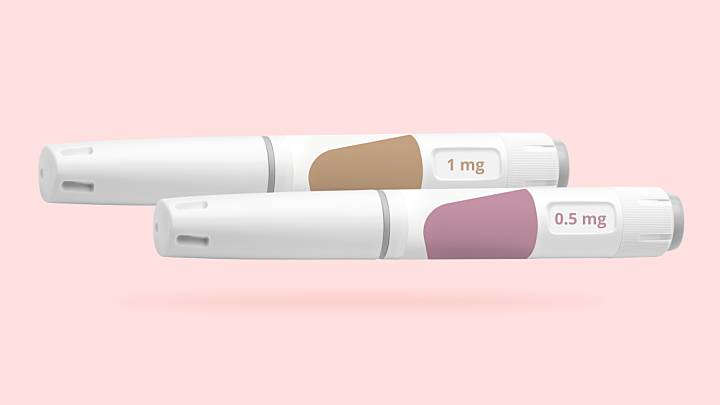GLP-1 Agonists: Diabetes Medication For Weight Loss

Medically reviewed by
Dr Babak AshrafiLast reviewed: 08 Feb 2024
GLP-1 agonists are medicines used to treat diabetes. They work by mimicking the hormone GLP-1, which your stomach releases when you eat. GLP-1 receptor agonists help your body make more insulin, lower your blood sugar levels, signal satiety to your brain and slow down the rate of digestion. For many patients taking GLP-1 agonists this leads to weight loss. Because of this, some diabetes medications have been approved for weight loss as well, but certain criteria must be met before a doctor will prescribe a GLP-1 agonist for weight loss.

What are GLP-1 receptor agonists?
Glucagon-like peptide-1 (GLP-1) receptor agonists were originally developed as type 2 diabetes treatments. They are typically used in diabetes injections that patients can administer themselves. They work by copying the action of a hormone your stomach releases when you eat, called GLP-1.
GLP-1 receptor agonists can also be used to help with weight loss. In the UK, there are 3 medicines with GLP-1 receptor agonists available as weight loss injections: Wegovy, Mounjaro and Saxenda.
Start a request for weight loss treatment
How does GLP-1 work?
GLP-1 is a hormone your body makes and releases in the stomach in response to eating food. GLP-1 then has several effects:
- It suppresses appetite by sending signals to the brain.
- It increases the levels of hormones called ‘incretins’.
- Incretins prompt your body to make more insulin when it’s needed and lower the amount of sugar (glucose) produced by the liver when it isn’t required.
GLP-1 also slows down the time it takes for your stomach to digest food and empty it, making you feel less hungry, so you eat less.
Can GLP-1 agonists be used for weight loss?
“Yes. Originally GLP-1 agonists were developed and used only as diabetes treatments. Taking them has led to significant weight loss for many patients as well, though, so after extensive testing GLP-1 agonists are now also available for weight loss in the UK. For example, the active ingredients in the Wegovy (semaglutide), Mounjaro (tirzepatide) and Saxenda (liraglutide) weight loss injections are GLP-1 agonists.” – Dr Babak Ashrafi, Clinical Lead for Service Expansion at ZAVA
In 2021 a review published that a weekly dose of 2.4 mg of semaglutide, the active ingredient in several diabetes and weight loss medicines, resulted in weight loss in numerous studies. A 6-month study involving 703 type 2 diabetic adult patients comparing the effect of 7 mg and 14 mg Rybelsus, a GLP-1 agonist in tablet form (currently licensed for diabetes only), with a placebo found that those taking the higher dose lost around 8 pounds in body weight. Those taking the 7 mg dose also lost around 5 pounds in body weight.
In a study involving 1,961 adults with a BMI of 30 or above (or 27 and above if they also had at least 1 weight-related condition), individuals who were assigned 68 weeks of 2.4 mg semaglutide injections lost an average of 14.9% of their body weight compared to 2.4% in the placebo group.
Research into the effectiveness of Saxenda found that 62.1% of participants lost at least 5% of their body weight over a 6 month treatment period. Another trial involving 338 participants found that the overall mean body weight reduction after 68 weeks of liraglutide treatment was -6.4% compared to -15.8% with semaglutide over the same period.
Are GLP-1 agonists legal in the UK?
Yes. GLP-1 agonists for weight loss are legal in the UK with a prescription. At the moment there are 3 GLP-1 agonists licensed specifically as active ingredients in weight loss treatments available on prescription in the UK; semaglutide, tirzepatide and liraglutide.
It is illegal to obtain GLP-1 receptor agonists or other diabetes medication for weight loss without a prescription from a doctor. Medicines that are obtained without a prescription can also be dangerous to your health as they may not be genuine.
Types of GLP-1 agonists for weight loss
There are several medications that are available for diabetes and weight loss. They are available in tablet or injection form. Some GLP-1 agonists have been specifically licensed for weight loss. Both tablets and diabetes injections for weight loss are examples of GLP-1 agonists.
At ZAVA we have a range of different treatments available to help you lose weight. You will need to meet the criteria to obtain a prescription. These medicines are only suitable for people who are obese or who are overweight and have other weight-related medical conditions, such as high blood pressure.
GLP-1 agonist injections for weight loss
GLP-1 receptor agonists work by increasing the levels of hormones called ‘incretins’ which tell your body to produce more insulin when it’s needed and reduce the amount of sugar in the blood when it isn’t needed. It also works on the brain to suppress appetite and delay the emptying of the stomach. This helps to control blood sugar levels, and also benefits weight loss. By now, several GLP-1 agonist medications have been developed specifically with weight loss in mind.
Wegovy
Wegovy injections are a treatment option for people who are either obese (with a BMI of 30 or over) or who are overweight (with a BMI of 27 or over) and experience weight-related health issues. The injections contain the active ingredient semaglutide, a GLP-1 agonist, and are used once per week. In STEP trials participants on average lost between 14% and 17% of their initial weight after 68 weeks. Wegovy is most effective when used alongside lifestyle changes including a healthy diet and regular exercise.
Start your journey with Wegovy
Mounjaro
Mounjaro is an injectable prescription-only medicine. The active ingredient tirzepatide mimics not just 1 but 2 hormones which are involved in hunger and satiety signalling.
Mounjaro weight loss injection is used to treat type 2 diabetes and has recently also been approved for treating weight loss by the Medicines and Healthcare Products Regulatory Agency (MHRA). Mounjaro contains the active ingredient tirzepatide. In order to treat weight loss it is authorised for adults with:
- a BMI of 30 kg/m2 or higher, or
- a BMI of 27-30 kg/m2 who also have a weight-related health condition such as high blood pressure, high cholesterol or heart disease
Start your journey with Mounjaro
Saxenda
Saxenda contains the GLP-1 agonist liraglutide and is injected once every day. Similarly to Wegovy and Mounjaro, it can be a suitable treatment if you have a BMI between 27 and 30 and health problems that are related to your weight (such as high blood pressure), or a BMI of 30 or higher. After 12 weeks on the highest dose (the maintenance dose) you can expect to have lost more than 5% of your starting weight.
Diabetes injections that can lead to weight loss
There are several GLP-1 receptor agonist injections available for the treatment of diabetes. In some cases, these diabetes injections can lead to weight loss as well.
Victoza
Victoza is a treatment for type 2 diabetes. It contains the active ingredient liraglutide, a GLP-1 agonist for weight loss and diabetes. Victoza injections are not currently approved for weight loss but some people who use it to treat diabetes may lose some weight. Victoza is used for people whose blood sugar levels cannot be properly controlled by diet and exercise alone or who cannot take metformin, another anti-diabetes medication.
Victoza contains the same active ingredient as Saxenda, a GLP-1 agonist for weight loss, but Saxenda is used at a higher dose.
Trulicity
Trulicity is a GLP-1 agonist used to treat type 2 diabetes. It contains the active ingredient dulaglutide. It works by improving blood sugar control in diabetic adults and is suitable for those who are at an increased risk of heart attacks or strokes because of their diabetes.
Trulicity is injected under the skin once per week and is only effective for people who have type 2 diabetes. Although Trulicity is not approved for weight loss, some people who use it have lost up to 10 lbs in body weight.
Ozempic
Ozempic is a prescription-only medicine used to treat type 2 diabetes. It is available as an injection and is used once weekly.
It is given to adults with type 2 diabetes to:
- manage blood glucose levels alongside diet and exercise changes
- lower the risk of heart attacks and stroke in people who also have heart disease
Ozempic may also be prescribed off-label as a diabetes injection for weight loss. However, it is more likely that a doctor will prescribe a GLP-1 agonist specifically licensed for weight loss, such as Wegovy, which contains the same active ingredient as Ozempic.
Oral diabetes medications
Oral diabetes medications are tablets that help people with type 2 diabetes manage their condition. There are many different types of medicines available to treat diabetes orally, including metformin, sulfonylureas, and GLP-1 receptor agonists.
An oral GLP-1 agonist sometimes used off-label for weight loss is Rybelsus. These tablets may be suitable for people who prefer not to self-inject their medication, perhaps because they have a fear of needles. They are also cheaper than weekly injections and contain the same active ingredient as Wegovy. However, there are specific oral weight loss medicines available and we do not provide off-label weight loss treatments at ZAVA.
Rybelsus
Rybelsus is a medicine available for adults with type 2 diabetes. It is available on prescription in 7 mg or 14 mg tablets. When taken alongside lifestyle changes such as diet and exercise it can improve blood sugar levels in adults with type 2 diabetes.
Rybelsus contains the active ingredient semaglutide, a GLP-1 receptor agonist which mimics the hormone GLP-1 that’s naturally released by the stomach in response to food, regulating appetite and controlling blood glucose levels.
Rybelsus may be available off-label as an oral GLP-1 agonist for weight loss, but this is not something we provide at ZAVA. The medication is not yet licensed as a weight management aid.
GLP-1 agonists: Drug comparison
Not all GLP-1 agonists are approved for weight loss, although some are available off-label. Your doctor is likely to prescribe approved weight loss medicines. Below we compare different GLP-1 receptor agonists according to their active ingredients, frequency and approved use.

What are the side effects and risks of GLP-1 agonists?
Each GLP-1 agonist for weight loss or type 2 diabetes will have different side effects according to the active ingredient they contain. Usually, these effects go away after a few days or weeks of taking the medicine. If the effects bother you or do not go away, you should speak to your doctor.
The most common side effects of weight loss or diabetes medication with a GLP-1 agonist include:
- feeling sick (nausea)
- diarrhoea
- stomach pains
- finding it difficult to go to the toilet or going less often than usual (constipation)
- decreased appetite
- headaches
- low blood sugar
- injection site reactions
Some GLP-1 receptor agonists can also increase the risk of:
- acute pancreatitis
- gallbladder disorders
- cholecystitis
- cholelithiasis
- kidney issues
- thyroid cancer
Are GLP-1 agonists safe for weight loss?
GLP-1 agonists can only be prescribed by a doctor and should be taken exactly as they are prescribed. However, patients must meet specific criteria to receive GLP-1 agonists for weight loss treatment. They are not intended to be used by people who want to lose a few pounds or who are not overweight or obese. In cases where a doctor has prescribed GLP-1 agonists, they are safe for patients to use.
Who should avoid GLP-1 agonists?
You should only take these medicines if your doctor agrees they are safe for you and provides a prescription. GLP-1 receptor agonists may not be suitable if you:
- are usually healthy
- are not diabetic or obese
- are pregnant or planning to get pregnant
In most cases, GLP-1 agonists for weight loss mean you need to have a BMI of 30 or more, or a BMI over 27 and a weight-related health condition. A doctor cannot prescribe a GLP-1 agonist for weight loss if you are not overweight or obese.
GLP-1 agonist contraindications
Like all medicines, GLP-1 agonists are not suitable for everyone. You may not be able to use these medicines if you:
- are allergic to any of the ingredients
- have a history of thyroid cancer
- have kidney problems
- have ketoacidosis
- have a history of pancreatitis
- have low blood sugar levels
- have diabetic eye disease (retinopathy)
You should let your doctor know if you have or have had any of the above conditions before they prescribe GLP-1 receptor agonists to you.
What is an alternative to GLP-1 agonist drugs for weight loss?
Apart from GLP-1 agonists there are other weight loss medications available for weight loss, such as:
Xenical is a prescription-only medicine that’s approved for weight loss. Xenical is a branded medicine but is also available as a generic medicine, called orlistat. It is a lipase inhibitor and works by lowering the amount of fat your body absorbs from meals, by attaching to lipase, the hormone responsible for helping your body to absorb fat.
Mysimba are weight loss tablets that reduce your appetite, so you feel fuller for longer after eating a meal. It contains the active ingredients naltrexone hydrochloride and bupropion hydrochloride which act on the areas of your brain responsible for appetite. Mysimba starts to work immediately and you should start to see results within a few days.
Conclusion
There are several different brands of GLP-1 agonists, which were initially only used to treat type 2 diabetes. Although some may be prescribed off-label for weight loss, some have been specifically approved for weight loss treatments. These, such as Wegovy, should be the preferred choice for weight loss under the supervision and guidance of a doctor. It’s important to note that these medicines can cause side effects and are not suitable for everyone.
Frequently asked questions
Which diabetic medication helps you lose weight?
GLP-1 receptor agonists are diabetes and weight loss medications. Active ingredients are for example semaglutide, liraglutide and tirzepatide. Studies show that people who use these medicines to treat their type 2 diabetes also often lose weight. This has led to some GLP-1 agonists being specifically approved for weight loss in the UK.
What BMI qualifies for GLP-1 agonists?
You’ll need a BMI of 30 or more to qualify for GLP-1 agonists for weight loss or 27 or above and have a weight-related health condition, such as high blood pressure, high cholesterol or heart disease.
What is the best injection for weight loss?
The best injection for weight loss will depend on your circumstances. You will need to satisfy some specific criteria to qualify for GLP-1 agonist treatment. Your doctor will discuss weight loss options with you before prescribing the right treatment.
Does diabetes cause weight loss?
Poorly controlled type 2 diabetes can cause unexplained weight loss in patients. If your body does not produce enough insulin, it can stop your cells from getting the glucose (sugar) they need for energy. When this happens, your body can start to burn fat and muscle for energy, resulting in weight loss. This is also common in type 1 diabetes.
Which GLP-1 agonist causes the most weight loss?
According to research, tirzepatide and semaglutide are associated with a greater reduction in body weight.

Dr Babak Ashrafi Clinical Lead for Service Expansion
Accreditations: BSc, MBBS, MRCGP (2008)
Babak studied medicine at King’s College London and graduated in 2003, having also gained a bachelor’s degree in Physiology during his time there. He completed his general practice (GP) training in East London, where he worked for a number of years as a partner at a large inner-city GP practice. He completed the Royal College of GPs membership exam in 2007.
Meet our doctorsLast reviewed: 08 Feb 2024
-
Clinical effectiveness of liraglutide on weight loss in South Koreans (2021) NIH [accessed 10 January 2024]
-
Diabetes medicines: GLP-1 agonists (2022) NHS [accessed 12 January 2024]
-
GLP-1 receptor agonists (2023) NICE [accessed 10 January 2024]
-
Glucagon-like peptide 1 receptor agonists and thyroid cancer: is it the time to be concerned? (2023) NIH [accessed 12 January 2024]





GMC: 6149061

GMC: 7074021

GMC: 7155722













